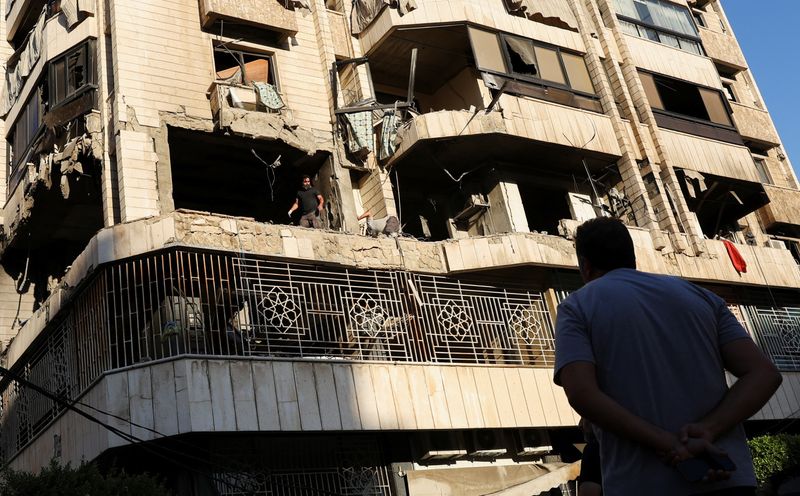
By Timour Azhari and Ari Rabinovitch
BEIRUT/JERUSALEM (Reuters) -Israel bombed central Beirut early on Thursday, killing at least six people, after its forces suffered their deadliest day on the Lebanese front in a year of clashes with Iran-backed Hezbollah.
Israel said it conducted a precise air strike on Beirut. Reuters witnesses reported hearing a massive blast, and a security source said it targeted a building in the central district of Bachoura near parliament, the closest an Israeli strike has come to the centre of Lebanon’s capital.
At least six people were killed and seven wounded, Lebanese health officials said. A photo circulating on Lebanese WhatsApp groups, which Reuters could not immediately verify, showed a heavily damaged building with its first floor on fire.
Three missiles also hit the southern suburb of Dahiyeh, where Hezbollah leader Hassan Nasrallah was killed last week, and loud blasts were heard, Lebanese security officials said. The southern suburbs came under more than a dozen Israeli strikes on Wednesday.
The Israel Defense Forces urged residents of Lebanese villages who have evacuated their homes not to return until further notice. “IDF raids are continuing,” spokesperson Avichay Adraee said on X on Thursday.
Yemen’s Iran-backed Houthi militant group said it launched drone strikes on Israel’s financial capital, Tel Aviv.
“The operation achieved its goals successfully by the arrival of the drones without being detected or shot down by the enemy,” said Yahya Saree, the group’s military spokesperson.
A day after Iran fired more than 180 missiles into Israel, Israel said on Wednesday eight soldiers were killed in ground combat in south Lebanon as its forces thrust into its northern neighbour.
The Israeli military said regular infantry and armoured units joined ground operations in Lebanon on Wednesday as Iran’s missile attack and Israel’s promise of retaliation fanned concern of a wider conflict in the oil-producing Middle East.
Hezbollah said its fighters engaged Israeli forces inside Lebanon. The movement reported ground clashes for the first time since Israeli forces pushed over the border on Monday. Hezbollah said it had destroyed three Israeli Merkava tanks with rockets near the border town of Maroun El Ras.
Israeli Prime Minister Benjamin Netanyahu, in a condolence video, said: “We are at the height of a difficult war against Iran’s Axis of Evil, which wants to destroy us.
“This will not happen because we will stand together and with God’s help, we will win together.”
G7, CHINA CALL FOR DIPLOMACY
Lebanon’s health ministry said Israeli air raids killed at least 46 people in south and central regions in the past 24 hours.
Iran said on Wednesday its missile volley – its biggest ever assault on Israel – was over, barring further provocation, but Israel and the United States promised to hit back hard.
U.S. President Joe Biden said he would not support any Israeli strike on Iran’s nuclear sites in response to its ballistic missile attack and urged Israel to act “proportionally” against its regional arch-foe.
Biden joined a call with other leaders of the Group of Seven major powers to coordinate a response, including new sanctions against Tehran, the White House said.
G7 leaders voiced “strong concern” over the Middle East crisis but said a diplomatic solution was still viable and a region-wide conflict was in no one’s interest, a statement said.
China called on the United Nations Security Council to take “urgent actions” to de-escalate the situation in the Middle East.
“The Security Council bears the primary responsibility for the maintenance of international peace and security,” China’s permanent representative to the U.N., Fu Cong, said during a Security Council briefing on Wednesday, Xinhua news said.
Fu said all parties “must return to the track of political and diplomatic solutions”.
Western nations have drafted contingency plans to evacuate citizens from Lebanon after Tuesday’s dramatic escalation, but none have launched a large-scale military evacuation yet, though some are chartering aircraft as Beirut airport stays open.
1.2 MILLION LEBANESE DISPLACED
Hezbollah said it repelled Israeli forces near several border towns and fired rockets at military posts in Israel.
The paramilitary group’s media chief Mohammad Afif said those battles were only the “first round” and that Hezbollah had enough fighters, weapons and ammunition to push back Israel.
Israel’s addition of infantry and armoured troops from the 36th Division, including the Golani Brigade, the 188th Armoured Brigade and 6th Infantry Brigade, suggested that the operation might expand beyond limited commando raids.
The military has said its incursion is largely aimed at destroying tunnels and other infrastructure on the border and there were no plans for a wider operation targeting Beirut to the north or major cities in the south.
Nevertheless, it issued new evacuation orders for about two dozen towns along the southern border, telling residents to head north of the Awali River, which flows east to west some 60 km (40 miles) north of the Israeli frontier.
More than 1,900 people have been killed and over 9,000 wounded in Lebanon in almost a year of cross-border fighting, with most of the deaths occurring in the past two weeks, according to Lebanese government statistics.
Caretaker Prime Minister Najib Mikati said about 1.2 million Lebanese had been displaced by Israeli attacks.
Malika Joumaa, from Sudan, took shelter in Saint Joseph’s church in Beirut after being forced from her house near Sidon in coastal south Lebanon with her husband and two children.
“It’s good that the church offered its help,” she said. “We were going to stay in the streets; where would we have gone?”
Iran described Tuesday’s missile assault as a response to Israeli killings of militant leaders, including Nasrallah, attacks in Lebanon against the group and Israel’s war against Iran-backed Palestinian Hamas militants in Gaza.
There were no casualties from the missile onslaught in Israel, but one person was killed in the Israeli-occupied West Bank.
(Reporting by James Mackenzie and Steven Scheer in Jerusalem; Maya Gebeily and Timour Azhari in Beirut; Parisa Hafezi in Istanbul; Phil Stewart, Jeff Mason and Idrees Ali in Washington; Michelle Nichols in New York; Adam Makary, Jaidaa Taha and Enas Alashray in Cairo; and Tala Ramadan, Jana Choukeir and Jack Kim in Seoul and Matthias Williams in Berlin, Elwely Elwelly and Clauda Tanios in Dubai and Angelo Amante and Giuseppe Fonte in Rome and Parisa Hafezi in Dubai; Writing by Cynthia Osterman and Michael Perry; Editing by Deepa Babington and William Mallard)
EMEA Tribune is not involved in this news article, it is taken from our partners and or from the News Agencies. Copyright and Credit go to the News Agencies, email news@emeatribune.com Follow our WhatsApp verified Channel





